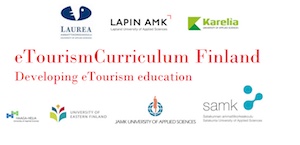Gamification in Tourism Marketing
This course provides knowledge on how to implement gamification elements in every day tourism business through digital technologies. Gamification opens up new opportunities to immerse guests into tourism services and creates ways for businesses to increase customer retention before the trip, during the trip and after the trip.
DETAILED IMPLEMENTATION PLAN
Code, name and number of ECTS of study unit
Gamification in Tourism Marketing, 5 ECTS
Language of course
English
R&D integration: Commissioner, Level of cooperation and/ or R&D task, Scope (ECTS)
Project integration during the course.
Virtuality: Description, Scope (ECTS)
100% (5 ECTS)
Recommended academic year
2nd year
Teacher in charge
Tarja Kupiainen & Seppo Nevalainen
Objectives
The student becomes aware of gaming and gamification in tourism.
The student understands the potential of different virtual marketing channels.
The student is aware of possibilities of mobile game applications as a marketing tool for the tourism industry.
The student is able to utilize potentials of mobile game apps and web games in the tourism industry.
The student is able to utilize multiple aspects of gamification in tourism marketing.
The student is able to choose relevant solutions for using gamification in tourism marketing based on his/her needs.
Content
Examples of good practices.
Utilizing of analyses of available technologies for gamification in tourism marketing.
Implementing gaming into tourism marketing strategy.
Engaging customers and employees with gamification.
Prerequisites
Basic knowledge of tourism business or game mechanics
Pedagogical arrangements
Online lessons
Online materials for self-studying
Virtual assignments
Materials
* F. Xu, F. Tian, D. Buhalis, J. Weber: Marketing tourism via electronic games: understanding the motivation of tourist players (researchgate.net);
* F. Xu, F. Tian, D. Buhalis, J. Weber, H. Zhang: Tourists as Mobile Gamers: Gamification for Tourism Marketing. Journal of Travel & Tourism Marketing. (http://dx.doi.org/10.1080/10548408.2015.1093999
* Gaming and Gamification in Tourism. Best Practice Report. https://thinkdigital.travel/wp-content/uploads/2014/05/Gamification-in-Tourism-Best-Practice.pdf
* Digitaalisten pelien hyödyntäminen matkailussa : Case Kainuu (http://theseus.fi/handle/10024/86783)
* Other materials are to be announced during the course.
Assignments
Independent work:
- Familiarizing with good practices, and available technologies
- Analyzing at least one example of online games and find out the possibilities to use them / it as a tool in tourism marketing
- Creating a realistic gamification plan for marketing a tourism enterprise
ASSESSMENT PLAN
Assessed parts and their share of total assessment
- Learning assignments 80 %
- Self-evaluation 20 %
Grading Scale
Excellent (5) – Satisfactory (1), Fail
General Assessment Criteria (taken from SoleOPS)
Excellent (5)
– The student has an excellent command of theoretical knowledge and is able to apply it fully in practical learning exercises. The student participates lectures actively and shows analytical, reflective and critical approach in all his/her activities. All the assignments are performed according to instructions.
Good (3–4)
– The student has a good command of theoretical knowledge and is able to apply it mostly in practical learning exercises. The student participates lectures quite actively and shows somewhat analytical, reflective and critical approach in most of his/her activities. All the assignments are performed mostly according to instructions.
Satisfactory (1–2)
– The student has a satisfactory command of theoretical knowledge and is able to apply it only partly or not at all in practical learning exercises. The student participates lectures seldom and shows very little or no analytical, reflective and critical approach in his/her activities. The assignments are not fully performed according to instructions.
Failed (0)
-The student has not participated the compulsory lectures and has failed to perform one or more assignments according to instructions.
To be taken into account
Software for detecting plagiarism is used when returning assignments (Urkund).
Late assignments are assessed according to the schedule the teacher/teachers have given. Late returns affect negatively the assessment of the assignment.
Please note that there can be more specific assessment criteria for the whole study unit and/or learning assignments which will be given at the beginning of the study unit
